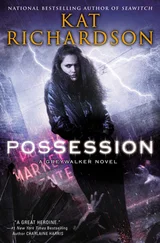“I’m not crying for help,” I objected.
“Yes, you are, and you need to stop that.”
“Excuse me?”
He sighed. “Harper, I know you don’t want to hear this, but you’ve gotten lazy about doing your own research—which is ironic, considering that’s essentially what you get paid to do. They’ve been gone most of a year already and you still send queries to Ben and Mara as if they have nothing better to do than answer your questions about magic. And, yes, yes, I do know they’re a great resource,” he added, putting his hands up to stop my objections. “And there’s no one out here half as useful, but that’s just the problem: You can’t use your friends that way.”
I gaped at him. “I don’t.”
“Yes, you do. And most of the time it’s all right—we don’t mind. But you said it yourself: You have to stop taking your friends for granted. I know you can manage to get through this stuff without treating people like resources.”
I felt stung and didn’t know what to say to that; at the same time I had the feeling there was more behind Quinton’s concern than he was saying. It was true that I tended to rely on my small circle of friends too much and, frankly, to put them in situations that weren’t always safe or comfortable because I needed something and I hadn’t weighed the possibility that they wouldn’t want to or might get hurt by helping me. And because I have an unnatural gift for persuasion, they didn’t tell me no when they probably should have. I looked down, suddenly uncomfortable. “I guess I’m a hard friend to have,” I muttered. “Or maybe . . . I just don’t know how to be a friend.”
Quinton wrapped one arm around my shoulders and pulled me tight against his side. “That is not true and I’m not trying to make you feel bad. I’m just reminding you—as you’ve said you wanted—that you need to think about these things before you presume on friendships. Ben and Mara and I would all walk across burning coals for you, but you shouldn’t assume that we don’t mind.”
I bit my lip hard. I didn’t like being reminded of all the ways I’d abused my friends, but while Quinton was only doing as I’d asked—kicking me in the conscience where I tended to have a blind spot—it was pissing me off. I can be a jerk—I’m not saying I can’t—but I wasn’t thrilled by being reminded of it. Especially when I had the increasingly strong feeling there was something he didn’t want to tell me and this conversation was at least partially a dodge to avoid it.
I took a few more long slow breaths and unlocked my jaw. “I’m not saying you shouldn’t remind me how to be a better friend, but maybe we should put further discussion of this off for now,” I suggested.
He looked hard at me, as if he were searching for a sign in my face that I apparently wasn’t giving. “All right,” he said at last. “But I don’t want to leave it like this.”
I shook my head in confusion. “Leave what?”
“No. I mean ‘leave’ as in actually go away: I have to go back out. I just wanted to . . . see you before I did.”
I frowned at him. “What’s wrong? Where do you have to go?”
“It’s just more work stuff. I have to do it.”
“Work stuff? Like with the three-letter acronyms?”
He made an uncomfortable shrug.
“I thought you were done with that.”
“Me, too,” he said, his voice rueful as he glanced away from me.
I wanted to ask a half-a-hundred questions, but I stifled them and we spent the next quarter hour trying to pretend we both weren’t uncomfortable and lying about it.
Finally I gave up. “Does this have an end?” I asked.
He squeezed his eyes shut and gave a tiny shake of his head. “I don’t know.” He stood up and took the plates out to the kitchen to keep the ferret from helping herself and, I guessed, to avoid making more of a reply.
I caught him before he could slip out the door. “Are you coming back?”
“Yeah. Just trust me.”
“I do.” I wanted to ask why he didn’t trust me, but I knew that would be a big, fat mistake. So I shut my mouth, which made our parting kiss a cold, narrow, and unsatisfying thing.
As soon as the door was closed behind him I wanted to scream in frustration. I was trying to be a better friend, even to my lover, to give as well as take, and here was something I could do nothing about. I couldn’t complain, I couldn’t remonstrate, I couldn’t even be sure what the problem was, though I’d have put money on the chance it was something to do with his mysterious family, since he’d been more forthcoming about having worked for the government than he was about them.
I growled and threw the nearest object: a coffee mug that shattered against the doorframe.
Broken ceramic showered down onto the floor and the ferret scampered to it, hopping in fury.
I watched her a moment, fuming, until her antics worked past my annoyance and left me shaking my head in self-disgust.
“That was a stupid thing to do,” I chided myself, fetching the dustpan and broom from the kitchen.
I went to clean up the mess, having to field the ferret away from the sharp bits of former mug. And afterward I sent an e-mail to Mara and Ben, anyhow.
* * *
There are few things more emotionally terrible than interviewing family members of missing persons presumed dead for twenty-seven years. When someone’s been missing for a short time, the family usually has strong ideas about whether they are dead or alive and what may have happened to them. They will even argue with one another and with the interviewer about it. But when someone’s been gone without word or trace for so long, the sadness and confusion settles in and some of these people who can otherwise manage their daily lives become painfully disconnected when they talk about the missing. Time seems to flutter around them, shifting the phase of their reference from now to then to . . . some strange, unspecified time that is neither future nor past.
Gary Fielding’s family was in Portland, so Solis and I had chosen to leave them aside unless necessary and started with the family of Janice Prince—one of the two women who’d been listed with the passengers. But we hadn’t made a lot of headway with the Princes. Janice’s mother, now in her early seventies, kept breaking into tears. Her father was stony, glowering at us and offering nothing but negative comments such as, “I always knew it. I knew she was a bad one,” which threw Mrs. Prince into fits of crying and arguing against him. Mrs. Prince countered with, “No, Janice wasn’t bad! She was confused, poor thing. She just—she just didn’t fit in!” and similar statements, when she could make one at all between bouts of upset and tears.
The conversation went in circles of blame and recrimination that broke down into Mrs. Prince sobbing about what a good girl her daughter had tried to be while her husband just shook his head in judgment.
“She couldn’t help falling in with that fast crowd down at the marina,” Mrs. Prince cried to me. “They were so—they seemed so charmed.”
“Boat trash,” her husband muttered.
Mrs. Prince gave him a pleading look. “They were so glamorous. Even the ones without any money always seemed to be going wonderful places and doing exciting things! How could a little girl like our Janice not fall for that? There weren’t bad people. They weren’t! They were just—”
“Trash!” Mr. Prince spat.
“No, they weren’t. Besides, Janice worked there. How could she avoid them?”
“Excuse me, Mrs. Prince,” I interrupted. “Your daughter worked at the marina?”
She turned her reddened eyes to me. “Yes . . .”
“What did she do there?”
“She . . . she worked in the convenience store at the end of the fuel dock.”
Читать дальше











